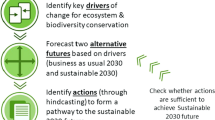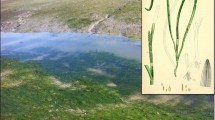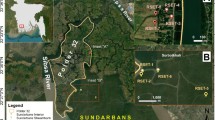Abstract
Climate change strains human and natural system sustainability worldwide. Plum Island Estuary, Massachusetts (PIE MA) salt marshes are socio-environmental ecosystems experiencing two such climate stressors: sea level rise (SLR) and the mud fiddler crab Minuca pugnax (= Uca pugnax Smith) range expansion. Salt marshes are important sources of ecosystem functioning and ecosystem services. Uncertainties remain, however, whether SLR and the fiddler crab range expansion will affect PIE ecosystem functioning and services over time by changing marsh area. We, therefore, determined in this study: (1) to what degree PIE marshes provide residents with cultural ecosystem services (e.g., recreation); (2) whether SLR and the fiddler crab range expansion influence marsh area; and (3) whether policy measures influence the direction of marsh services in the face of SLR and multiple potential impacts of range expanding fiddler crabs. We developed a system dynamics model, parameterized with data from stakeholder surveys, the IPCC Report, and a literature review. We modeled low, moderate, and high SLR both with fiddler crabs enhancing marsh erosion and growth, and with and without mitigation strategies on marsh area and recreation. The multi-stressor effects of fiddler crab erosion enhancement and high SLR rates decreased marsh area by 2250. Future losses to marsh area caused declines in recreational days. Policy interventions (e.g., erosion reduction and tidal flood mitigation) largely mitigated these losses. Fiddler crab marsh growth by itself also strongly mitigated the effects of SLR. These results provide critical transdisciplinary insight for residents, scientists, and practitioners working to enhance PIE sustainability, and for researchers studying how to support environmental sustainability at scale.




Similar content being viewed by others
References
Aspey WP (1978) Fiddler crab behavioral ecology: burrow density in Uca pugnax (Smith) and Uca pugilator (Bosc) (Decapoda Brachyura). Crustaceana 34(3):235–244
Balvanera P et al (2006) Quantifying the evidence for biodiversity effects on ecosystem functioning and services. Ecol Lett 9(10):1146–1156. https://doi.org/10.1111/j.1461-0248.2006.00963.x
Balvanera P et al (2014) Linking biodiversity and ecosystem services: current uncertainties and the necessary next steps. Bioscience 64(1):49–57. https://doi.org/10.1093/biosci/bit003
Barbier EB et al (2011) The value of estuarine and coastal ecosystem services. Ecol Monogr 81(2):169–193. https://doi.org/10.1890/10-1510.1
Beamish RJ et al (2004) Regimes and the history of the major fisheries off Canada’s west coast. Prog Oceanogr 60(2–4):355–385. https://doi.org/10.1016/j.pocean.2004.02.009
Bertness MD (1985) Fiddler crab regulation of Spartina alterniflora production on a New England salt marsh. Ecology 66(3):1042–1055
Bromberg DK, Bertness MD (2005) New England salt marsh losses using reconstructing historical maps. Estuaries 28(6):823–832
Burrows MT et al (2011) The pace of shifting climate in marine and terrestrial ecosystems. Science 334(6056):652–655. https://doi.org/10.1126/science.1210288
Cammen LM, Seneca ED, Stroud LM (1980) Energy flow through the fiddler crabs Uca pugnax and U. minax and the Marsh Periwinkle Littorina irrorata in a North Carolina Salt Marsh. Am Midl Nat 103(2):238–250
Carus J, Paul M, Schröder B (2016) Vegetation as self-adaptive coastal protection: reduction of current velocity and morphologic plasticity of a brackish marsh pioneer. Ecol Evol 6(6):1579–1589. https://doi.org/10.1002/ece3.1904
DeConto RM et al (2021) The Paris Climate Agreement and future sea-level rise from Antarctica. Nature 593(7857):83–89. https://doi.org/10.1038/s41586-021-03427-0
Deegan LA et al (2012) Coastal eutrophication as a driver of salt marsh loss. Nature 490(7420):388–392. https://doi.org/10.1038/nature11533
Feagin RA et al (2010) Salt marsh zonal migration and ecosystem service change in response to global sea level rise: a case study from an urban region. Ecol Soc. https://doi.org/10.5751/ES-03724-150414
Gedan KB, Silliman BR, Bertness MD (2009) Centuries of human-driven change in salt marsh ecosystems. Annu Rev Mar Sci 1(1):117–141. https://doi.org/10.1146/annurev.marine.010908.163930
Gedan KB et al (2010) The present and future role of coastal wetland vegetation in protecting shorelines: answering recent challenges to the paradigm. Clim Change 106(1):7–29. https://doi.org/10.1007/s10584-010-0003-7
Goldstein JH et al (2012) Integrating ecosystem-service tradeoffs into land-use decisions. Proc Natl Acad Sci USA 109(19):7565–7570. https://doi.org/10.1073/pnas.1201040109
Goodman LA (1961) Snowball sampling. Ann Math Stat 32(1):148–170. https://doi.org/10.1214/aoms/1177705148
Gribsholt B, Kostka JE, Kristensen E (2003) Impact of fiddler crabs and plant roots on sediment biogeochemistry in a Georgia saltmarsh. Mar Ecol Prog Ser 259:237–251. https://doi.org/10.3354/meps259237
Heal GM et al (2005) Protecting natural capital through ecosystem service districts. SSRN Electron J. https://doi.org/10.2139/ssrn.279114
Holdredge C et al (2010) Fiddler crab control of cordgrass primary production in sandy sediments. Mar Ecol Prog Ser 399:253–259. https://doi.org/10.3354/meps08331
IPCC (2014) Climate change 2014: impacts, adaptation and vulnerability—contributions of the Working Group II to the Fifth Assessment Report—summary for policymakers. Climate change 2014: impacts, adaptation and vulnerability—Contributions of the Working Group II to the Fifth Assessment Report, pp 1–32. https://doi.org/10.1016/j.renene.2009.11.012
Johnson DS (2011) High-marsh invertebrates are susceptible to eutrophication. Mar Ecol Prog Ser 438:143–152. https://doi.org/10.3354/meps09306
Johnson DS (2014) Fiddler on the roof: a northern range extension for the marsh fiddler crab, Uca pugnax. J Crustac Biol 34(5):671–673. https://doi.org/10.1017/CBO9781107415324.004
Johnson DS, Williams BL (2017a) Sea level rise may increase extinction risk of a saltmarsh ontogenetic habitat specialist. Ecol Evol 7(19):7786–7795. https://doi.org/10.1002/ece3.3291
Johnson DS, Williams BL (2017b) Sea level rise may increase extinction risk of a saltmarsh ontogenetic habitat specialist. Ecol Evol. https://doi.org/10.1002/ece3.3291
Johnson DS et al (2016) Saltmarsh plant responses to eutrophication. Ecol Appl 26(8):2647–2659
Katz LC (1980) Effects of burrowing by the fiddler crab, Uca pugnax (Smith). Estuar Coast Mar Sci 11(2):233–237. https://doi.org/10.1016/S0302-3524(80)80043-0
Kirwan ML, Megonigal JP (2013) Tidal wetland stability in the face of human impacts and sea-level rise. Nature 504(7478):53–60. https://doi.org/10.1038/nature12856
Kirwan M, Temmerman S (2009) Coastal marsh response to historical and future sea-level acceleration. Quat Sci Rev 28(17–18):1801–1808. https://doi.org/10.1016/j.quascirev.2009.02.022
Kirwan ML et al (2011) Rapid wetland expansion during European settlement and its implication for marsh survival under modern sediment delivery rates. Geology 39(5):507–510. https://doi.org/10.1130/G31789.1
Kirwan ML et al (2012) On the relationship between sea level and Spartina alterniflora production. Ecosystems 15(1):140–147. https://doi.org/10.1007/s10021-011-9498-7
Kobryn HT et al (2018) Cultural ecosystem values of the Kimberley coastline: an empirical analysis with implications for coastal and marine policy. Ocean Coast Manag 162:71–84. https://doi.org/10.1016/j.ocecoaman.2017.09.002
Langston AK et al (2020) Modeling long-term salt marsh response to sea level rise in the sediment-deficient Plum Island Estuary, MA. Limnol Oceanogr 65(9):2142–2157. https://doi.org/10.1002/lno.11444
Levin LA et al (2001) The function of marine critical transition zones and the importance of sediment biodiversity. Ecosystems 4(5):430–451. https://doi.org/10.1007/s10021-001-0021-4
Luk YC, Zajac RN (2013) Spatial ecology of fiddler crabs, Uca pugnax, in Southern New England Salt Marsh landscapes: potential habitat expansion in relation to salt marsh change. Northeast Nat 20(2):255–274. https://doi.org/10.1656/045.020.0213
MaCivor LH, Melvin SM, Griffin CR (1990) Effects of research activity on piping plover nest predation. J Wildl Manag 54(3):443–447
Martínez-Soto KS, Johnson DS (2020) The density of the Atlantic marsh fiddler crab (Minuca pugnax, Smith, 1870) (Decapoda: Brachyura: Ocypodidae) in its expanded range in the Gulf of Maine, USA. J Crustac Biol 40(5):544–548. https://doi.org/10.1093/jcbiol/ruaa049
Mavrommati G, Bithas K, Panayiotidis P (2013) Operationalizing sustainability in urban coastal systems: a system dynamics analysis. Water Res 47(20):7235–7250. https://doi.org/10.1016/j.watres.2013.10.041
Mcdonald RI, Kareiva P, Forman RTT (2008) The implications of current and future urbanization for global protected areas and biodiversity conservation. Biol Conserv 141(6):1695–1703. https://doi.org/10.1016/j.biocon.2008.04.025
Milcu AI et al (2013) Cultural ecosystem services: a literature review and prospects for future research. Ecol Soc. https://doi.org/10.5751/ES-05790-180344
Morris JT, Sundberg K, Hopkinson CS (2013) Salt marsh primary production and its responses to relative sea level and nutrientsin estuaries at plum island, Massachusetts, and North Inlet, South Carolina, USA. Oceanography 26(3):78–84. https://doi.org/10.5670/oceanog.2013.48
Nabavi E, Daniell KA, Najafi H (2017) Boundary matters: the potential of system dynamics to support sustainability? J Clean Prod 140:312–323. https://doi.org/10.1016/j.jclepro.2016.03.032
Nelson JA et al (2018) Feedbacks between nutrient enrichment and geomorphology alter bottom-up control on food webs. Ecosystems 22(2):229–242. https://doi.org/10.1007/s10021-018-0265-x
Paradis A et al (2008) Role of winter temperature and climate change on the survival and future range expansion of the hemlock woolly adelgid (Adelges tsugae) in eastern North America. Mitig Adapt Strat Glob Change 13(5–6):541–554. https://doi.org/10.1007/s11027-007-9127-0
Poloczanska ES et al (2016) Responses of marine organisms to climate change across oceans. Front Mar Sci 3(May):1–21. https://doi.org/10.3389/fmars.2016.00062
R Core Team (2021) R: a language and environment for statistical computing. Foundation for Statistical Computing. Vienna, Austria. Available at: https://www.r-project.org/
Redfield AC (1972) Development of a New England salt marsh. Ecol Monogr 42(2):201–237
Reed MS (2008) Stakeholder participation for environmental management: a literature review. Biol Conserv 141(10):2417–2431. https://doi.org/10.1016/j.biocon.2008.07.014
Rudgers JA et al (2020) Climate disruption of plant–microbe interactions. Annu Rev Ecol Evol Syst 51:561–586. https://doi.org/10.1146/annurev-ecolsys-011720-090819
Sanford E et al (2006) Larval tolerance, gene flow, and the northern geographic range limits of fiddler crabs. Ecology 87(11):2882–2894. https://doi.org/10.1890/0012-9658(2006)87
Schröter D et al (2005) Ecology: ecosystem service supply and vulnerability to global change in Europe. Science 310(5752):1333–1337. https://doi.org/10.1126/science.1115233
Signorell A (2021) Package “ DescTools”
Smith SM, Green CW (2015) Sediment suspension and elevation loss triggered by atlantic mud fiddler crab (Uca pugnax) bioturbation in salt marsh dieback areas of Southern New England. J Coast Res 31(1):88–94. https://doi.org/10.2112/JCOASTRES-D-12-00260.1
Sotka EE, Byers JE (2019) Not so fast: promoting invasive species to enhance multifunctionality in a native ecosystem requires strong(er) scrutiny. Biol Invasions 21(1):19–25. https://doi.org/10.1007/s10530-018-1822-0
Sterman JD (2012) Sustaining sustainability: creating a systems science in a fragemented academy and polarized world. In: Sustainability science: the emerging paradigm and the urban environment, pp 21–56
Trisos CH, Merow C, Pigot AL (2020) The projected timing of abrupt ecological disruption from climate change. Nature 580(7804):496–501. https://doi.org/10.1038/s41586-020-2189-9
Twilley RR et al (2016) Co-evolution of wetland landscapes, flooding, and human settlement in the Mississippi River Delta Plain. Sustain Sci 11(4):711–731. https://doi.org/10.1007/s11625-016-0374-4
Vanbergen AJ et al (2013) Threats to an ecosystem service: pressures on pollinators. Front Ecol Environ 11(5):251–259. https://doi.org/10.1890/120126
Vedogbeton H, Johnston RJ (2020) Commodity consistent meta-analysis of wetland values: an illustration for coastal marsh habitat, environmental and resource economics. Springer Netherlands, Amsterdam
Vejre H, Jensen FS, Thorsen BJ (2010) Demonstrating the importance of intangible ecosystem services from peri-urban landscapes. Ecol Complex 7(3):338–348. https://doi.org/10.1016/j.ecocom.2009.09.005
Wang A, Wang Y, Chen J (2008) Role of Spartina alterniflora on sediment dynamics of coastal salt marshes—case study from central Jiangsu and middle Fujian coasts. Front Earth Sci China 2(3):269–275. https://doi.org/10.1007/s11707-008-0021-1
Watson EB et al (2018) Wetland loss patterns and inundation-productivity relationships prognosticate widespread salt for Southern New England. Estuar Coasts 40(3):662–681. https://doi.org/10.1007/s12237-016-0069-1.Wetland
Wickham H (2021) Package “tidyverse”
Wigand C et al (2017) A climate change adaptation strategy for management of coastal marsh systems. Estuar Coasts 40(3):682–693. https://doi.org/10.1007/s12237-015-0003-y
Acknowledgements
We thank all the survey participants for their time and information. The Plum Island Estuary Long Term Ecological Research site (PIE LTER) provided valuable data and connections to reach out to an initial pool of PIE stakeholders. Thank you to the University of Massachusetts Institutional Review Board (UMB IRB), IRB Reference Number: 2020008.
Author information
Authors and Affiliations
Corresponding author
Additional information
Handled by Barbara Neumann, Research Institute for Sustainability - Helmholtz Centre Potsdam (RIFS), Germany.
Publisher's Note
Springer Nature remains neutral with regard to jurisdictional claims in published maps and institutional affiliations.
Supplementary Information
Below is the link to the electronic supplementary material.
Rights and permissions
Springer Nature or its licensor (e.g. a society or other partner) holds exclusive rights to this article under a publishing agreement with the author(s) or other rightsholder(s); author self-archiving of the accepted manuscript version of this article is solely governed by the terms of such publishing agreement and applicable law.
About this article
Cite this article
Roy, M.S., Byrnes, J.E.K. & Mavrommati, G. Mitigation policies buffer multiple climate stressors in a socio-ecological salt marsh habitat. Sustain Sci 19, 245–258 (2024). https://doi.org/10.1007/s11625-023-01414-0
Received:
Accepted:
Published:
Issue Date:
DOI: https://doi.org/10.1007/s11625-023-01414-0




